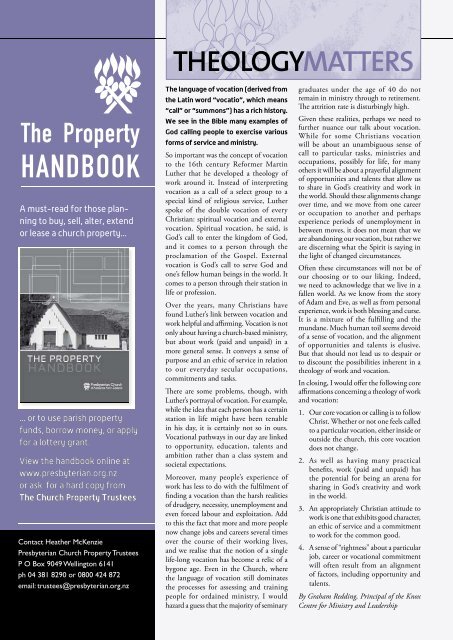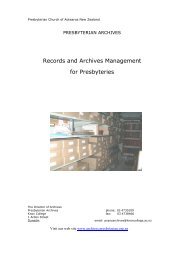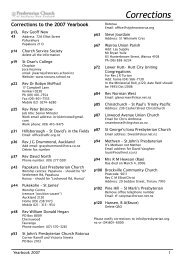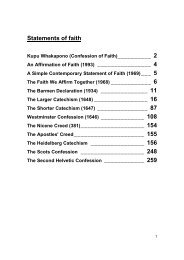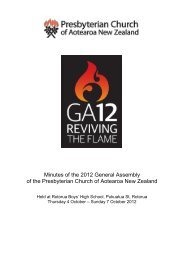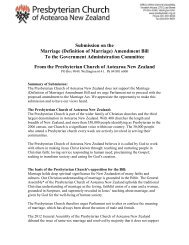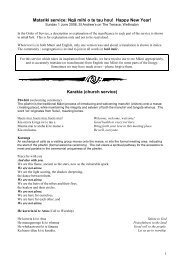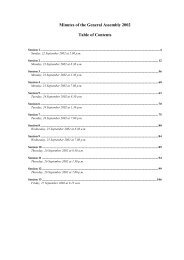Spanz magazine - Presbyterian Church of Aotearoa New Zealand
Spanz magazine - Presbyterian Church of Aotearoa New Zealand
Spanz magazine - Presbyterian Church of Aotearoa New Zealand
You also want an ePaper? Increase the reach of your titles
YUMPU automatically turns print PDFs into web optimized ePapers that Google loves.
THEOLOGYMATTERS<br />
The Property<br />
HANDBOOK<br />
A must-read for those planning<br />
to buy, sell, alter, extend<br />
or lease a church property...<br />
... or to use parish property<br />
funds, borrow money, or apply<br />
for a lottery grant.<br />
View the handbook online at<br />
www.presbyterian.org.nz<br />
or ask for a hard copy from<br />
The <strong>Church</strong> Property Trustees<br />
Contact Heather McKenzie<br />
<strong>Presbyterian</strong> <strong>Church</strong> Property Trustees<br />
P O Box 9049 Wellington 6141<br />
ph 04 381 8290 or 0800 424 872<br />
email: trustees@presbyterian.org.nz<br />
The language <strong>of</strong> vocation (derived from<br />
the Latin word “vocatio”, which means<br />
“call” or “summons”) has a rich history.<br />
We see in the Bible many examples <strong>of</strong><br />
God calling people to exercise various<br />
forms <strong>of</strong> service and ministry.<br />
So important was the concept <strong>of</strong> vocation<br />
to the 16th century Reformer Martin<br />
Luther that he developed a theology <strong>of</strong><br />
work around it. Instead <strong>of</strong> interpreting<br />
vocation as a call <strong>of</strong> a select group to a<br />
special kind <strong>of</strong> religious service, Luther<br />
spoke <strong>of</strong> the double vocation <strong>of</strong> every<br />
Christian: spiritual vocation and external<br />
vocation. Spiritual vocation, he said, is<br />
God’s call to enter the kingdom <strong>of</strong> God,<br />
and it comes to a person through the<br />
proclamation <strong>of</strong> the Gospel. External<br />
vocation is God’s call to serve God and<br />
one’s fellow human beings in the world. It<br />
comes to a person through their station in<br />
life or pr<strong>of</strong>ession.<br />
Over the years, many Christians have<br />
found Luther’s link between vocation and<br />
work helpful and affirming. Vocation is not<br />
only about having a church-based ministry,<br />
but about work (paid and unpaid) in a<br />
more general sense. It conveys a sense <strong>of</strong><br />
purpose and an ethic <strong>of</strong> service in relation<br />
to our everyday secular occupations,<br />
commitments and tasks.<br />
There are some problems, though, with<br />
Luther’s portrayal <strong>of</strong> vocation. For example,<br />
while the idea that each person has a certain<br />
station in life might have been tenable<br />
in his day, it is certainly not so in ours.<br />
Vocational pathways in our day are linked<br />
to opportunity, education, talents and<br />
ambition rather than a class system and<br />
societal expectations.<br />
Moreover, many people’s experience <strong>of</strong><br />
work has less to do with the fulfilment <strong>of</strong><br />
finding a vocation than the harsh realities<br />
<strong>of</strong> drudgery, necessity, unemployment and<br />
even forced labour and exploitation. Add<br />
to this the fact that more and more people<br />
now change jobs and careers several times<br />
over the course <strong>of</strong> their working lives,<br />
and we realise that the notion <strong>of</strong> a single<br />
life-long vocation has become a relic <strong>of</strong> a<br />
bygone age. Even in the <strong>Church</strong>, where<br />
the language <strong>of</strong> vocation still dominates<br />
the processes for assessing and training<br />
people for ordained ministry, I would<br />
hazard a guess that the majority <strong>of</strong> seminary<br />
graduates under the age <strong>of</strong> 40 do not<br />
remain in ministry through to retirement.<br />
The attrition rate is disturbingly high.<br />
Given these realities, perhaps we need to<br />
further nuance our talk about vocation.<br />
While for some Christians vocation<br />
will be about an unambiguous sense <strong>of</strong><br />
call to particular tasks, ministries and<br />
occupations, possibly for life, for many<br />
others it will be about a prayerful alignment<br />
<strong>of</strong> opportunities and talents that allow us<br />
to share in God’s creativity and work in<br />
the world. Should these alignments change<br />
over time, and we move from one career<br />
or occupation to another and perhaps<br />
experience periods <strong>of</strong> unemployment in<br />
between moves, it does not mean that we<br />
are abandoning our vocation, but rather we<br />
are discerning what the Spirit is saying in<br />
the light <strong>of</strong> changed circumstances.<br />
Often these circumstances will not be <strong>of</strong><br />
our choosing or to our liking. Indeed,<br />
we need to acknowledge that we live in a<br />
fallen world. As we know from the story<br />
<strong>of</strong> Adam and Eve, as well as from personal<br />
experience, work is both blessing and curse.<br />
It is a mixture <strong>of</strong> the fulfilling and the<br />
mundane. Much human toil seems devoid<br />
<strong>of</strong> a sense <strong>of</strong> vocation, and the alignment<br />
<strong>of</strong> opportunities and talents is elusive.<br />
But that should not lead us to despair or<br />
to discount the possibilities inherent in a<br />
theology <strong>of</strong> work and vocation.<br />
In closing, I would <strong>of</strong>fer the following core<br />
affirmations concerning a theology <strong>of</strong> work<br />
and vocation:<br />
1. Our core vocation or calling is to follow<br />
Christ. Whether or not one feels called<br />
to a particular vocation, either inside or<br />
outside the church, this core vocation<br />
does not change.<br />
2. As well as having many practical<br />
benefits, work (paid and unpaid) has<br />
the potential for being an arena for<br />
sharing in God’s creativity and work<br />
in the world.<br />
3. An appropriately Christian attitude to<br />
work is one that exhibits good character,<br />
an ethic <strong>of</strong> service and a commitment<br />
to work for the common good.<br />
4. A sense <strong>of</strong> “rightness” about a particular<br />
job, career or vocational commitment<br />
will <strong>of</strong>ten result from an alignment<br />
<strong>of</strong> factors, including opportunity and<br />
talents.<br />
By Graham Redding, Principal <strong>of</strong> the Knox<br />
Centre for Ministry and Leadership


